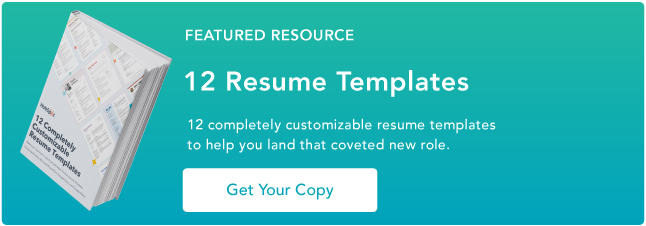
When I graduated college, I didn't have much prior work experience, besides a high school gig at a chocolate shop and a college internship at a publishing firm.
However, I had something I believed made up for it — hard and soft skills.
Admittedly, some of these skills likely didn't stand out to recruiters as particularly impressive. "Facebook", for instance, is probably a skill I didn't need to include, seeing as I wasn't even applying for a social media position.
However, other skills, like "ability to work under pressure" and "proficient in Adobe Creative Suite", did help me, particularly when I tailored my skills to fit the job description.
It's critical you provide applicable and exceptional skills in your resume to show recruiters you're an ideal candidate.
To help you create an impressive resume and demonstrate your unique qualifications, I spoke with HubSpot recruiters to consolidate 17 recruiter-approved skills (and useful tips) that'll help you get the job.
Skills for Resume
- Ability to Work Under Pressure
- Leadership
- Graphic Design
- SEO Marketing
- Copywriting
- Ability to implement Social Media campaigns
- Data Analysis
- Foreign Languages
- Editing
- Proficient in Java Programming
- Quick Learner
- Detail-oriented
- Teamwork
- Adaptability
- Communication
- Creativity
- Proficient in Microsoft Office, including Excel and Powerpoint
The Difference Between Hard and Soft Skills
There's a difference between soft and hard skills, and most recruiters I spoke with emphasized the importance of hard skills in a resume. Hard skills are skills required for the job, and are acquired through education, training, or experience. They are quantifiable skills that can be measured or tested, such as web design, computer programming, or finance.
Soft skills, on the other hand, are more abstract and less easy to measure. They are attributes and personality traits that demonstrate how you'll interact with others within the company. For instance, "strong communicator", "detail-oriented", or "self-motivated" are soft skills that are not necessarily required for the role, but could nonetheless help you succeed in the role.
I spoke with Johanna Fleming, a Services Recruiter here at HubSpot, about hard and soft skills and which are more critical for a resume. She told me, "Mostly, hard skills stand out. Soft skills don’t add a ton of value to resumes because they can be very objective. For example, many people add that they have things like 'strong communication skills' … but it’s a bit fluffy because who is evaluating their communication skills? That said, hard skills definitely are more important to highlight — especially technical skills and experiences. If someone is familiar with certain platforms or applications, it's also definitely important to highlight those!"
Additionally, to demonstrate the validity of the skill, it's important you incorporate real metrics. Holly Peterson, a Senior Recruiter here at HubSpot, told me it's critical you include "a track record of metrics-driven performance, and/or the impact you've had in each role. This could be something like, 'Increase sales leads by 25%,' or 'Drove new users in thousands'."
Noah Gilman, a Recruiting Team Lead at HubSpot, agrees. He said, "If you claim to have done really well in your last role but don't put any numbers behind it, that really weakens your message."
Along with including metrics in your work experience section, Noah suggests sticking to hard skills as much as possible — "Stick to … things that you can answer questions about from a recruiter, like 'What have you built using java?' or 'Talk to me about a cool report you built in Tableau', instead of something a recruiter would never ask … like 'Talk to me about when you had strong communication skills'".
Additionally, Glory Montes, an Associate Campus Recruiter, mentioned a few other hard and soft skills that stand out as particularly impressive, including "presentation skills — it's a big green flag if a resume mentions a time the candidate had to present to senior managers or present on work they did. I also look for collaboration skills, like if a candidate mentions they worked with co-workers in other departments. Being able to communicate across disciplines shows adaptiveness and strong communication skills. Finally, showing project work outside of your day-to-day responsibilities shows me that you are passionate about your discipline."
It's also important to avoid vague or general statements, which could seem untrue, particularly if other applicants often use the same phrases. To avoid this, Roshan Shah, a HubSpot recruiter, told me specificity is key — "I don't think many recruiters like seeing general statements like, 'improved X process' or 'built relationships with stakeholders'. I strongly prefer more explicit details, like how much you improved a process or how you built relationships, and with which stakeholders."
How to Add The Right Skills to Your Resume
Each time you send your resume to a company, you want to slightly alter or tailor your skills to match the job description or the requirements for the role.
To create a role-specific list of skills, begin by looking at the job description itself. For instance, take a look at this role description for the Senior Communication Designer position on HubSpot's Careers page:

From these sections, we can glean a few hard and soft skills you'll need to include.
I've highlighted the soft skills you'll want to emphasize in yellow — including an ability to work under pressure, strong time-management skills, a desire to learn, and an ability to collaborate well with diverse team members.
Alternatively, the hard skills you'd want to emphasize are in green — including fluency in Adobe Creative Suite, proficiency in UX design, and an ability to design products for both web and print.
Of course, it goes without saying — don't list any skills you don't actually have.
Roshan Shah echoes this, telling me, "Candidates should use their actual skill set as the barometer for how many things to list on their resume, rather than just the job description. They should list things they're actually proficient in — if you say you’re comfortable using AdWords because it’s on the job description, but then we test you and you end up being pretty novice with it, that’s going to look much worse than if you'd just left it off your resume in the first place."
After you've looked at the job description, do some research on job sites like Glassdoor or Monster to see qualifications other companies include for similar positions. This enables you to include skills the hiring manager hasn't listed, demonstrating your potential to bring something unique to the role.
Paulina Valdez, a Senior Recruiter at HubSpot, told me, "It's important to highlight the technical skills that the role requires. For my Spanish Translator role, I look for CAT tools in a resume, like MemoQ and SDL Trados. Soft skills are more buzz words than anything, so I prioritize hard skills related to the role."
Finally, consider a list of soft skills you believe truly reflect your personality and work ethic. Include these if you believe they're relevant for the position to which you're applying. For instance, in my skills section of my resume, I've included "passion for learning". While this attribute might not be listed for a specific role, it's an authentic description and highlights in which type of work environment I do well, so it felt necessary to include.

